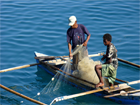
Earlier, east timor was best known for its sandalwoods. In the year 1999, most of east timor’s economic resources were destroyed by the Indonesian occupants. Around 260,000 people fled to the occident during this oppressive period of time. Later, an international programme by the United Nations led to the allocation of 5000 peacekeepers and 1300 police officers. This was all set up in an attempt to reconstruct the infrastructure of east timor. A few years down the line, about 50,000 of the refugees had returned. A very promising project is the joint development with Australia. As per this project, east timor and Australia have a joint pact over the development of natural gas and petroleum resources in southeast east timor.
The Portuguese administration had granted concessions to the oceanic exploration corporation. This was again done in order to develop the deposits. But sadly it was curtailed by the Indonesian invasion in 1976. In 1989, the timor gap treaty divided the resources between Indonesia and Australia. This very important treaty also established rules for exploiting seabed resources in the gap left in 1972. Revenues from this joint pact were to be divided equally. A few companies to begin this development were Woodside Petroleum and ConocoPhillips. They were obviously acting on behalf of the government.
During the time of its independence, east timor did not inherit any permanent boundary. This repudiated the timor gap treaty as illegal. The timor sea treaty (20th may, 2002) defined a proper joint petroleum development area (JPDA). 90% of revenues from existing projects were awarded to east timor and 10% to Australia. The largest JPDA was the greater sunrise gas field. Its exploitation led to separate agreements in 2003 and 2005. Only 20% of this field happens to lie within the treaty. The rest does not conform to the norms.
The government of east timor is now planning to negotiate with the nation of Australia to define a fixed boundary between the two nations. This is in accordance with the united nations convention on the law of the sea.
The year 2007 saw a bad year for harvesters in east timor. The bad harvest led to numerous deaths across the country. It was a dark time for the Timorese people. There was shortage of food. Many people suffered due to this and some died. Some even fled to other states. Even until November 2007, eleven districts required food supplies and other forms of international aid.
East timor has a promising and lucrative coffee industry. This region sells organic coffee to many trade fairs and also in the open market. East timor is famous for its storehouse of coffee products. Presently, there are three foreign banks in Dili. These are Australia’s ANZ, portugal’s Banco Nacional Ultramarino and indonesia’s Bank Mandiri. East timor, surprisingly, does not have any patent laws.
